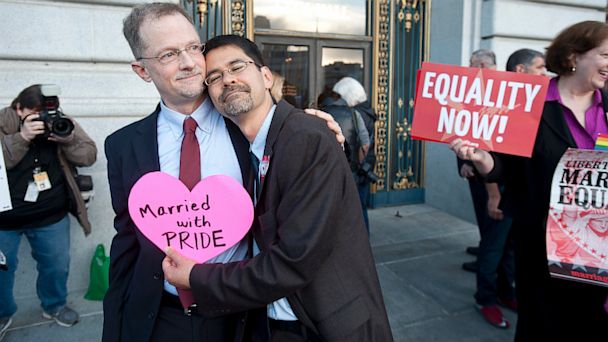Death of DOMA Boosts Immigration Bill Chances

John Lewis, left, and Stuart Gaffney embrace outside San Francisco's City Hall shortly before the U.S. Supreme Court ruling cleared the way for same-sex marriage in California, June 26, 2013. Photo Credit: Noah Berger/AP Photo
Analysis by Jim Avila and Serena Marshall
Today's Supreme Court decision to strike down the Defense of Marriage Act (DOMA) makes passing immigration reform just a little easier. How do the two collide?
Under DOMA the federal government did not recognize marriages of same-sex couples, thereby preventing them from accessing federal benefits-including the ability to sponsor a spouse for a visa.
Democrats wanted to change that under the new immigration bill.
Sen. Patrick Leahy's, D-Vt., introduced an amendment allowing gays and lesbians to sponsor their partners for immigration in the same way married heterosexual couples would be able to do.
But Republicans on the "Gang of 8? objected and threatened to scuttle the entire compromise. Leahy withdrew his bill but has been threatening to bring it back before the final vote.
One Long, Arduous Day on the Road to Overhaul
It was a painful concession for Democrats and led to complaints that liberals were caving to conservative Republicans too much. But Sen. Chuck Schumer, D-N.Y., told his party to look at the big picture and save the compromise immigration legislation.
"The result [if Leahy's amendment passes]: no equality [and] no immigration bill. Everyone loses," said Schumer during the May markup.
"The security and prosperity of our nation is too vital, too rare to let [the bill] fail now," Schumer said. "As much as it pains me, I cannot support this amendment if it will bring down the bill."
Sen. Dianne Feinstein, D-Calif., who voted 'no' during markup to maintain the bipartisan support for the legislation, referenced the Supreme Court pending decision at the time in late May saying "the Supreme Court may just settle all of this…may make this question moot."
Now she appears to be right. Gays and Lesbians will be allowed to sponsor their partners now, not because of Senator Leahy's amendment, but because of the Supreme Court.
Immigration Overhaul Clears Pivotal Vote in Senate
Today, Leahy agreed and said on the Senate floor there is no need for his special amendment to protect gays and lesbians and will not be seeking a floor vote on his amendment.
"Last month I was forced to make one of the most difficult decisions in my 38 years as a senator," Leahy said of his decision to withdraw his amendment. "But with the Supreme Court's decision today, it appears that the anti-discrimination principle that I've long advocated will apply to our immigration laws and to binational couples and their families can now be united under the law."
According to UCLA's Williams Institute 24,700 same-sex couples are bi-national, meaning one of the citizens is a U.S. citizen and one is not.